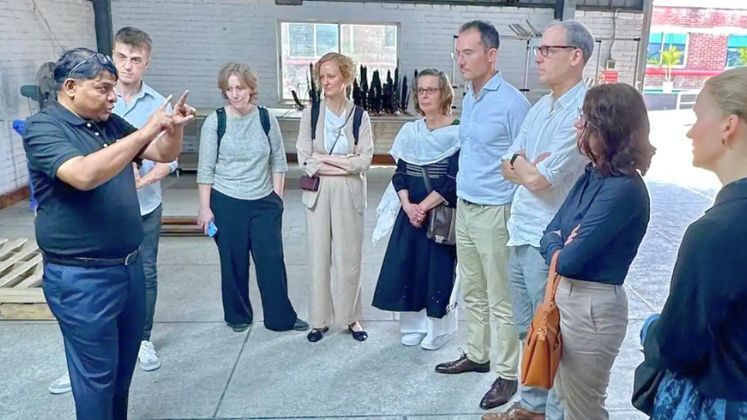
A high-level German business delegation recently visited Bangladesh to assess opportunities for expanding economic ties, particularly in light of ongoing US-China tariff tensions. The delegation, which included representatives from Germany’s Foreign and Economic ministries, export credit agency, and international development organizations, participated in the Bangladesh Investment Summit 2025 in Dhaka and held meetings with the interim government.
Organised by the German Asia-Pacific Business Association (OAV), the trip aimed to gather information, establish contacts, and evaluate Bangladesh’s reform policies and investment climate. Thomas Köning, CEO of Ospig GmbH and a delegation member, praised Bangladesh’s resilience as an emerging market, citing promising macroeconomic indicators and input factors attractive to foreign investors.
Bilateral trade between Germany and Bangladesh stood at US $ 9.8 billion in 2023, with Germany being Bangladesh’s second-largest export destination in the EU. The majority of Bangladeshi exports to Germany are textiles, accounting for over 90 per cent, making the ready-made garments (RMG) sector the backbone of bilateral trade. Several German companies operate manufacturing facilities in Bangladesh, particularly in garments and leather goods, employing thousands of workers. Notable firms include Ospig, which produces high-quality jeans and jackets, and Picard, known for handbags and accessories since 1995.
The visit comes at a time when global trade faces uncertainties due to US tariffs. In April, the US imposed a 37 per cent tariff on Bangladeshi goods, notably impacting the RMG sector, which exports approximately US $ 7.34 billion worth of garments annually, around 80 per cent of Bangladesh’s exports to the US. While some tariffs were temporarily eased, the policy uncertainty has created challenges for Bangladeshi suppliers.
Amid these disruptions, Bangladesh is increasingly viewed as a potential manufacturing hub to replace China in certain sectors. Köning noted that US tariffs on China and geopolitical shifts are prompting German firms to explore alternative locations for production of consumer goods, household appliances, electronics, and industrial components. With a population of 114 million and a middle-income status comparable to Malaysia’s, Bangladesh presents significant opportunities for foreign investment.
Economist Masrur Reaz called this a “once-in-a-generation” opportunity for Bangladesh to diversify its industrial base beyond textiles. He urged the Government to address regulatory hurdles, logistics issues, and productivity gaps to capitalize on this window.
However, challenges remain. A recent World Bank report highlighted barriers such as electricity shortages, limited access to finance, and corruption. German investors are cautious amid ongoing political transition, as interim leader Muhammad Yunus seeks to implement democratic reforms and hold elections by next June. Rössner from OAV noted that German companies are hesitant during this period of political uncertainty, emphasising the need for stability to attract long-term investment.
While Bangladesh’s garment industry has demonstrated resilience and growth, stakeholders agree that seizing this moment requires swift policy reforms and improved business conditions. As the world looks for alternatives to China, Bangladesh’s RMG sector stands poised to benefit from increased foreign interest, provided the country can deliver on its reform promises.






